 |
| He has become a major activist for civilized humanity and universal values. Not in words but in deeds. Not in one location but around the world. For he believes in the long tradition of Ismaili community values -- that education, self-reliance, solidarity and character are the elements which keep a community vibrant and healthy and lead to enlightenment and dignity. |

His Highness the Aga Khan, leader of the Ismaili Muslims, delivered thebaccalaureate address to the Class of 1996 at 1:30 p.m. Sunday, May 26, inthe Meeting House of the First Baptist in America, near the BrownUniversity campus in Providence, R.I.
The text of President Gregorian's introduction is as follows.
Speech by President Vartan Gregorian
In the name of Brown University and the 231 previous baccalaureate speakers, I greet you.
Ladies and Gentlemen, members of the Class of 1996:
It is my great honor to introduce Brown's 232nd baccalaureate speaker. His Highness Prince Karim Aga Khan IV is the first Muslim baccalaureate speaker in Brown's history and I dare say in the history of the Ivy League. He embodies the ecumenical spirit that links the three great monotheistic religions: Judaism, Christianity and Islam.
The Aga Khan, a direct descendant of the Prophet Muhammed, became 49th Imam -- spiritual leader -- of the Shia Ismaili Muslims in 1957 at the age of 20. This followed the death of his grandfather, Sir Sultan Mahomed Shah Aga Khan, who wanted to be succeeded by "a young man who has been brought up in the midst of the new age." His grandfather, twice president of the League of Nations, and his father saw his gifts and his potential, just as your grandparents and parents saw yours, as they encouraged you to reach for the stars at this University.
Thus, the new Aga Khan shouldered great responsibilities even before he received his undergraduate degree. His challenge was awesome. After all, he was succeeding his grandfather, a world leader.
For nearly four decades as Imam, the Aga Khan has amply fulfilled his father's trust and his grandfather's expectations. In spite of his youth, he established himself firmly not only as spiritual leader, but also as an enlightened guardian of the far-flung Ismaili community's welfare and progress.
But he has done much more than that. He has become a major activist for civilized humanity and universal values. Not in words but in deeds. Not in one location but around the world. For he believes in the long tradition of Ismaili community values -- that education, self-reliance, solidarity and character are the elements which keep a community vibrant and healthy and lead to enlightenment and dignity.
It was inevitable, then, that the advent of his strong leadership should bring about flourishing systems for welfare, learning, housing and culture. Under his patronage, dramatic action has been taken in the restoration of some of the great monuments of Islamic civilization.
The Aga Khan, during the past four decades, has traveled widely, read avidly and consulted frequently in his determination to combine theory with the essential experience required for making responsible philanthropic investments in his community as well as worldwide. His firsthand knowledge of competing economic development theories and processes and his own site inspections of social projects -- whether in the Pamir Mountains, Tanzania or Bangladesh -- are singularly important.
Equally vital are his faith in education and his ability to tap the resources of European, Asian and American institutions of higher learning to enhance the well-being of humankind.
"Education," he has said, "has been important to my family for a long time. My forefathers founded Al Azhar University in Cairo some 1,000 years ago, at the time of the Fatimid Caliphate in Egypt. Discovery of knowledge was seen by those founders as an embodiment of religious faith, and faith as reinforced by knowledge of workings of the Creator's physical world. The form of universities has changed over those 1,000 years, but that reciprocity between faith and knowledge remains a source of strength."
To see how well these enlightened actions succeeded, you need only visit the Aga Khan University and the Aga Khan Hospital in Karachi where people of different faiths, races and classes receive the same high quality education and care -- for that university and that hospital are the best in the region. You may then multiply what you see many times over, because there is a vast number of projects in every realm of human improvement that are done under the aegis of the Aga Khan Development Network.
He has affected the lives of millions. Indeed, only ten days ago, while I was in Chicago, a driver from Pakistan, noting my accent, inquired about my place of birth. When I said I was born in Iran, he asked if I was familiar with the Aga Khan. I said I was slightly familiar with the Aga Khan.
He said, "Everything I have I owe to him -- my spiritual welfare, my business."
"And do you know," he continued, "He is coming to the United States. I wish there were an opportunity for me to thank my Imam!"
He then turned down the visor and showed me the Aga Khan's picture. Your Highness, I told him that when I see you, I will thank you on behalf of Fateh Ali Jindhani and all the Fateh Ali Jindhanis of the world. They are a legion and they are of all faiths.
As an educator, I thank you on behalf of universities where no Islamic Civilization was taught and where, thanks to your munificence such teaching now exists.
One more private, personal thank you -- for entrusting the education of Prince Rahim to Brown University. We are grateful for your trust, we salute Prince Rahim, your beloved daughter Princess Zahra and your son Prince Hussain.
Ladies and gentlemen, members of the Class of 1996, I present to you this inspiring leader, great humanitarian, statesman and man of learning and culture, His Highness Prince Karim Aga Khan IV.
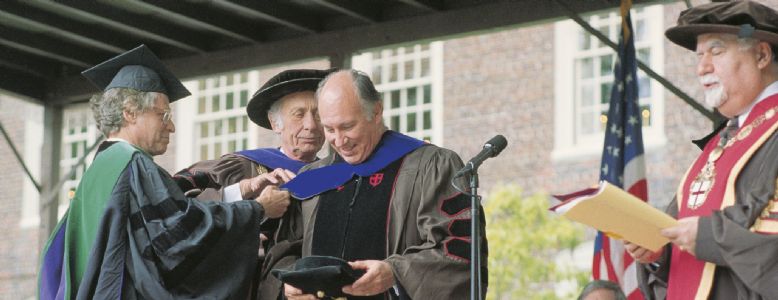
The text of the Aga Khan's address follows.
With permission from the Secretariat of His Highness
the Aga Khan
Copyright © 1996
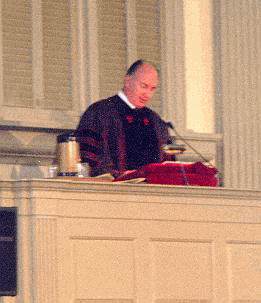
President Gregorian
Faculty Members
Post Graduates and
Graduating Students
Ladies and Gentlemen,
President Gregorian, thank you for your very generous words. It is a greathonour for me to be at this Commencement Ceremony as Brown represents much ofwhat is best in Western liberal education. Let me also congratulate thegraduating students for whom the memory of this day, I am sure, will remainwith them throughout their lives.
One of the things most often said to university students on their graduation day is that they must now prepare to face the "real world." You should be glad to hear that I am not going to tell you that, but as someone who has been living and working in the real world for a very long time, I can tell you this; the world is now a different place.
It is different from what it was forty years ago, five years ago, different even from last month's world. It is different because we are witnessing a massive acceleration in the rate of global change. Today's world is a living environment in which you will have to adapt much faster than your parents did, in order to have a positive and constructive impact on the future. Having said this, the means at your disposal to achieve such an impact have multiplied exponentially during the last decade. Never before has there been so much knowledge available about so many different people; never before have we known more about the physical world in which we live; never before, therefore, have the opportunities been greater to make a better life for more people around the globe.
For the last fifty years, our planet has been frozen by a paralysing bi-polar political vortex which we call the Cold War. During those years, many allowed their views to stagnate and harden into notions so dependable that they became unrevisable dogmas : My capitalism versus your communism, your Eastern bloc versus our Western bloc, and left versus right. But like the Berlin Wall, our old bi-polar system was dismantled almost overnight, and with it the black and white world to which we had grown accustomed. Unfortunately, views and thought habits, although intangible, are less easily broken than bricks and politics. Learned human behaviour dies hard.
The world has become a hurtling place in which change occurs constantly, and in which we need to learn, again, to evolve. Free now from an artificial tug-o-war in which most were only expected to identify with the rope, we are facing a world of doubt and questioning, and universal uncertainty, the new hallmark of our time. Growing from our thawing earth today, is the unsure and uncomfortable process of discovering and learning about mobility and change. In all societies, disconcerting but pertinent questions are being asked: Who will lead in the process of change? What beliefs should guide us? Will they be scientific statements and data, or philosophical visions? What constraints or opportunities will shape our future? What are the priorities that we must address first, and why should they be priorities? That these questions are answered correctly should be a source of concern to us all. Because if the responses do not come principally from those of us fortunate enough to have been educated, fortunate enough to have food and medicine and shelter, who can make progress in providing these things to the less fortunate, the responses will come from the contestations of the excluded. In short, the responses should come from you.
In this new and challenging environment, the people and nations which were paralysed by someone else's struggle for supremacy are free now to hope. Despite global acceleration, America still benefits from the intellectual liberty and hope for the future on which this nation was founded. But these elements, too easily taken for granted by those who are used to them, are of primordial concern in many other societies. In Algeria, Bosnia, Rwanda, Tajikistan, people are fighting and dying because their lives can finally be changed. Those nations which used to be part of the Third World, have become an obscure "south" and "east" that, in emerging from obscurity, are increasingly present. Indeed, the world you are about to enter is a fluid one in which you will have to be flexible.
 President Gregorian tells me that I am the first Muslim ever to give
the Baccalaureate address at a Brown Commencement in the school's illustrious
232-year history. This makes the occasion a very special honour for me.
It also carries the considerable, even intimidating responsibility to speak
about the place of Islam and of Muslims in the world today, about their
hopes and aspirations, and about the challenges that they face. It is also
my responsibility, and indeed a pleasure for me, to speak about what might
be done, and some things that are being done, to respond to these challenges.
My position, since 1957 as Imam of the Shia Ismaili Muslims bears no political
mandate, it is an independent one from which I can speak to you openly.
President Gregorian tells me that I am the first Muslim ever to give
the Baccalaureate address at a Brown Commencement in the school's illustrious
232-year history. This makes the occasion a very special honour for me.
It also carries the considerable, even intimidating responsibility to speak
about the place of Islam and of Muslims in the world today, about their
hopes and aspirations, and about the challenges that they face. It is also
my responsibility, and indeed a pleasure for me, to speak about what might
be done, and some things that are being done, to respond to these challenges.
My position, since 1957 as Imam of the Shia Ismaili Muslims bears no political
mandate, it is an independent one from which I can speak to you openly.
Today in the occident, the Muslim world is deeply misunderstood by most. The West knows little about its diversity, about the religion or the principles which unite it, about its brilliant past or its recent trajectory through history. The Muslim world is noted in the West, North America and Europe, more for the violence of certain minorities than for the peacefulness of its faith and the vast majority of its people. The words "Muslim" and "Islam" have themselves come to conjure the image of anger and lawlessness in the collectiveconsciousness of most western cultures. And the Muslim world has, consequently,become something that the West may not want to think about, does not understand, and will associate with only when it is inevitable.
Not only is this image wrong, but there are powerful reasons that we cannot overlook, for which the West and the Muslim world must seek a better mutual understanding. The first of those reasons is that with the Eastern bloc weakened militarily, financially and politically, the Muslim world is one of only two potential geopolitical forces vis-a-vis the West on the world stage; the other being the East Asian Tigers. There are large Muslim minorities living in, and impacting, many European countries. The Muslim world controls most of the remaining fossil fuel reserves. There is a resurgence of Islam in countries of strategic importance to the West, such as Turkey. Several Muslim states have nuclear ambitions. The Gulf war proved that events in the Muslim world do havea direct impact on global economics and security. The West should ignore neither the evolution of the Muslim Central Asian Republics nor their interplay on the future of Russia. Much of sub-Saharan Africa, is Muslim, and none of us can turn our backs on this continent in need.
The second reason why the Islamic world and the West should seek increased mutual understanding is that in the wake of the Cold War, it has become obvious that violence and cruelty of all ilk are a plague gaining ground around the globe. It can be military, or para-military and brutal, or it can be structuraland inconspicuous, and no less brutal. It ranges from suicide bombings toethnic cleansing to the forgetting and abandoning of large segments of society,even by industrialised nations such as this one.
Against this worrying global background it must be made utterly clear thatin so far as Islam is concerned, this violence is not a function of the faithitself, as much of the media would have you believe. That is a misperceptionwhich has become rampant, but which should not be endowed with any validity,nor should it be accepted and given credibility. It is wrong and damaging. Themyth that Islam is responsible for all the wrong doing of certain Muslims maywell stem from the truism that for all Muslims, the concepts of Din and Dunya,Faith and World, are inextricably linked. More so than in any othermonotheistic religion of the world. The corollary is that in a perfect world,all political and social action on the part of Muslims would always be pursuedwithin the ethical framework of the faith. But this is not yet a perfect world.The West, nonetheless, must no longer confuse the link in Islam, betweenspiritual and temporal, with that between state and church.
With the deaths of King Charles the First, and Louis the Sixteenth, Westernculture initiated a process of secularisation which grew into present daydemocratic institutions, and lay cultures. Islam, on the other hand neverendorsed any political dogma. So the historical process of secularisation whichoccurred in the West, never took place in Muslim societies. What we arewitnessing today, in certain Islamic countries, is exactly the oppositeevolution, the theocratisation of the political process. There is no unanimityin the Islamic world on the desirability of this trend but it would certainlybe less threatening if the humanistic ethics of the faith were the drivingforce behind the processes of change.
The news-capturing power of this trend contributes to the Western tendencyto perceive all Muslims or their societies as a homogeneous mass of peopleliving in some undefined theocratic space, a single "other" evolving elsewhere.And yet with a Muslim majority in some 44 countries and nearly a quarter of theglobe's population, it should be evident that our world cannot be made up ofidentical people, sharing identical goals, motivations, or interpretations ofthe faith. It is a world in itself, vast and varied in its aspirations, and itsconcerns.
Is there not something intellectually uncouth about those who choose toperceive 1 billion people of any faith as a standardised mass?
It is possible that the near-total burden of underdevelopment from whichonly a few Muslim countries have yet been able to extricate themselves, unitesus in the eyes of the West and thus sets us apart from it. No world faith,perhaps, has such a high concentration of people living in poverty and fear,from disease to political disenchantment, to the defenselessness of nationalintegrity, from the loss of cultural identity to confusion in the face of thenew forces of pluralism, free market economics and meritocracy. No reasonableor equitable mind, could question either the logic or the justification for ourfear of occidentalisation, or the loss of our Muslim identity. No one couldquestion our fear of the disassociation of our belief and practice from oursecular lives, of our difficulties in producing and managing wealth, of ourneed to create a system of laws compatible with the ethics of our faith, but noless compatible with today's world and the needs of tomorrow.
The Muslim World, once a remarkable bastion of scientific and humanistknowledge, a rich and self-confident cradle of culture and art, has neverforgotten its past. The abyss between this memory and the towering problemsof tomorrow would cause disorientation even to the most securesocieties.
You may ask, and justly so, what has happened to that world, and why has itreached such an advanced stage of fragility? Many contemporary problems of theIslamic world are the result of punctual political conflicts, prompted by theend of colonialism or the Cold War. Are the roots of the conflict in Kashmirnot anchored in the partition of India in 1947? Are not the civil wars inAfghanistan and Tajikistan due more to the political convulsions of the dyingCold War than to religious conflict between Muslims themselves? Is the conflictin Algeria caused by differences in interpretation of the faith amongAlgerians, or by an attempt at political change which, put to the test, hasfailed? These conflicts are some of the less fortunate legacies of Islamicstates having been used, like others, as pawns or proxies in the Cold War.
Yet many other problems facing the Muslim world now, have existed forcenturies. From the seventh century to the thirteenth century, the Muslimcivilizations dominated world culture, accepting, adopting, using andpreserving all preceding study of mathematics, philosophy, medicine andastronomy, among other areas of learning. The Islamic field of thought andknowledge included and added to much of the information on which allcivilisations are founded. And yet this fact is seldom acknowledged today, beit in the West or in the Muslim world, and this amnesia has left a six hundredyear gap in the history of human thought.
It was during the 15th century that Muslim civilisation began a period ofdecline, losing ground to European economic, intellectual and culturalhegemony. Islamic culture began to be marginalised, and worse yet, its horizonsnarrowed until it lost its self-respect, and pursued no further the culturaland intellectual search on which it was embarked. Even as Muslim learning wasstudied in the greatest universities in Europe, La Sorbonne, Oxford, Bologna,it was being forgotten in all Muslim societies from the fourteenth century on.Little of what was discovered and written by Muslim thinkers during theclassical period is taught in any educational institution, and when it is, duecredit is not given. This gap in global knowledge of the history of thought,and the faith, of a billion people is illustrated in innumerable ways,including in such diverse worlds as that of communication and of architecture.Our cultural absence in the general knowledge of the Western world partiallyexplains why your media sees Islamic thought as an ideological or politicaldeterminant in predominantly Muslim cultures, and refers to mere individualsaffiliated with terrorist organisations as Muslim first, and only then by theirnational origin or ideological or political goals.
This is a considerable problem for the Islamic world in its relations withthe West, particularly because of the impact your public opinion has on thedecisions of your democratic governments. But rather than to dwell upon thissensitive issue, I would like to illustrate how, in another professional field- architecture - an analogous breach is being filled through an unprecedentedjoint effort by the Islam world and the West.
Since 1957, the Aga Khan Development Network has been involved in building alarge number of schools, hospitals, housing estates and other constructions inthe Muslim world. It became clear that whilst the use of the buildings wasusually adequately defined they had less and less to do with the architecturaltraditions of the societies that they were to serve. I found that others toowere facing the same questions. Together, we enlarged our questioning, and itbecame starkly apparent that across the whole of the Muslim world, practicallywithout exception, its great traditions of architecture had disappeared fromits cultural expression. Once the issue had been identified, some of thegreatest architects in the world, from some of the finest schools, and men andwomen from all disciplines and all religious backgrounds - Muslim, Jewish,Christian, Hindu, Buddhist - joined me, creating an Architectural Award andeducational programmes to help address the crisis in our own built environment.The aim was to widen for people of all backgrounds, the sources of knowledgeand inspiration for the design languages of Islamic societies. After twodecades the best buildings and spaces of the Islamic world, evaluated byinternational juries of the highest calibre, are exceptional once again.Designed and used by Muslims and non-Muslims alike, they now address some ofthe most intractable problems of our age: urbanisation, management of the builtenvironment and shelter for the very poor.
This exemplifies the kind of remarkable outcome that educated men and women,from around the world, can achieve, in as little as twenty years, to beginreversing the hundreds of years of decay which have eroded our culturalidentity.
Much of the West's knowledge, and intellectual potential, is concentrated inUniversities such as Brown, that have, in recent years, worked their way muchdeeper into their wider societies. They have developed global objectivesaddressing global issues, thus becoming more accessible as partners in thedevelopment efforts of the Third World.
The Aga Khan University was founded thirteen years ago in Pakistan withplanning assistance from Harvard. It was the first private self-governinguniversity in that country of 125 million people. Medical Science was theinitial field of engagement. As Pakistan had one of the lowest ratios in theworld of nurses to doctors, and the nursing profession was mired in mediocrity,social unacceptability and low pay, nursing became our priority. With theassistance of McMaster University in Ontario, a curriculum was designed and aSchool of Nursing launched. In addition to becoming a leading academicinstitution, it has transformed the role of women in society by providing themwith new educational and professional opportunities. This solution to some ofPakistan's most pressing health care problems, which has also enhanced thesocial self-worth and professional status of women in the country, may soon bereplicated in other areas. Under the university's international charter, thenursing school now envisages the creation of an Institute of Advanced NursingStudies in East Africa to extend the same professional and societalopportunities to the women of Kenya, Tanzania, Uganda, and further afield.
First-world knowledge can be introduced and creatively absorbed intothird-world environments to assist in resolving some of its most challengingdevelopment problems. Success will depend, at least partially, on theadaptability of the knowledge to be shared, and the willingness and receptivityof the social structures that will be affected. The knowledge exists and itsadaptability is proven, the material resources can be found, but the social andcultural empathy which prepare any successful long-term process of human changefrom one society to another, are still deeply lacking.
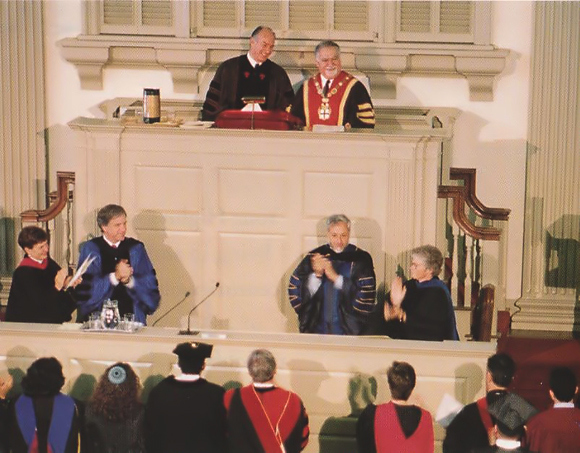 The same consideration also applies to ideas. Concepts such as meritocracy,free-world
economics, or multi-party democracy, honed and tested in the Westmay generally
have proven their worth. But valid though they may be,responsible leadership
in the Islamic world must ask if they can be adapted totheir cultures which
may not have the traditions or infra-structure toassimilate them: There
is a real risk that political pluralism could hardenlatent ethnic or religious
divisions into existing or new political structures.There is a real risk
that marketplace economics could lead to ruthlesscompetition, and increased
concentration of wealth, further marginalising theexisting poor. There
is a real risk that meritocracy could exacerbate, forexample, the existing
problem of equitable access to quality education andsophisticated health
care. Although the modern page of human history waswritten in the West,
you should not expect or desire for that page to bephotocopied by the Muslim
world.
The same consideration also applies to ideas. Concepts such as meritocracy,free-world
economics, or multi-party democracy, honed and tested in the Westmay generally
have proven their worth. But valid though they may be,responsible leadership
in the Islamic world must ask if they can be adapted totheir cultures which
may not have the traditions or infra-structure toassimilate them: There
is a real risk that political pluralism could hardenlatent ethnic or religious
divisions into existing or new political structures.There is a real risk
that marketplace economics could lead to ruthlesscompetition, and increased
concentration of wealth, further marginalising theexisting poor. There
is a real risk that meritocracy could exacerbate, forexample, the existing
problem of equitable access to quality education andsophisticated health
care. Although the modern page of human history waswritten in the West,
you should not expect or desire for that page to bephotocopied by the Muslim
world.
You, the graduates, are entering your own society at a time when it isquestioning many of its own determinants, and seeking stability, direction andinspiration from its own ethical and cultural roots. In the Muslim world we aredoing the same.
No doubt you are seeking to prepare yourselves, as well as you can, for therisks and opportunities of the suddenly globalised environment in which youwill live and work. In the Muslim world we arc doing the same.
As globalisation unfolds, the Islamic world will be there in myriad ways.Multitudinous encounters are inevitable.
It is time for all of us to ask: how can we ensure that these innumerablecontacts will result in a more peaceful world, and a better life?
We should be seeking out and welcoming these encounters, and not fearingthem. We should be energising them with knowledge, wisdom and shared hope.
But this will be enormously difficult to achieve until the civilisations andfaith of the Islamic world are part of the mainstream of world culture andknowledge, and fully understood by its dominant force which is yours in theWest.
In this exhilarating new world of unprecedented knowledge, freedom to use itoutside worn out dogmas, and immediate global communication, it should be amatter of serious concern to the West and the Islamic world, that such a deepgulf of misinformation and misunderstanding subsists. That gulf conditions theway we perceive each other. Its omnipresence damages our capacity to build abetter world for ourselves. And it has no basis in logic. The great Muslimphilosopher al-Kindi wrote eleven hundred years ago, "No one is diminished bythe truth, rather does the truth ennoble all." That is no less true today.
It is only here in the West that governments, intelligentsia, media,entrepreneurs are all -- in some way -- linked to your universities. Theyimpact,or actually create, much of our world's general and specialised knowledge. Theychallenge what may be wrong and validate what is correct. They research whatthey do not know. Is it not time for you to use these tools to build a bridgeacross the gulf of knowledge which separates the Islamic world from the West?Do you question that we will be by your side? No, if I can judge from my ownexperience.
We have much to build with. A common Abrahamic monotheistic tradition.Common
ethical principles, founded on shared human values. Common problems ofyesterday,
resolved together. Common challenges of tomorrow, that we can bestface
together. These, and all that much more that I cannot enumerate, but arefact,
are the materials with which to build a bridge. Enlightened by soundintellect,
I see its structure strongly built from the realities of our world.But
any structure requires bonding, and of all the bonds that can linksocieties,
America epitomises the strongest. It is called hope. The right tohope is
the most powerful human motivation I know. Its importance has beenparamount
in the history of this nation. It is a reasonable expectation thatthe next
generation will be better equipped to address the challenges of lifethan
the present one. How beautiful that bridge of hope would be between theWest
and the Islamic world.
With permission from the Secretariat of His Highness the Aga Khan
Copyright © 1996
The following is the text of the humorous note added by the Aga Khan to his above address:
"Looking around this colorful gathering, I recall helping in the choice of the Aga Khan University's regalia. Our research into Islamic traditions of academic dress revealed that an academic's rank determined the height of his hat. The higher the rank, the taller the hat. The senior most professors therefore appeared taller than their students even when sitting down. I have just learnt that my friend Neil Rudenstein, the President of Harvard has given instructions that all Harvard hats are to be heightened by at least a foot. This has caused havoc in the Ivy League which is now debating resolution MAHH96, standing for Maximum Allowable Hat Height. My academic standing and that of President Gregorian, should be evident from the hats that we are presently wearing!"
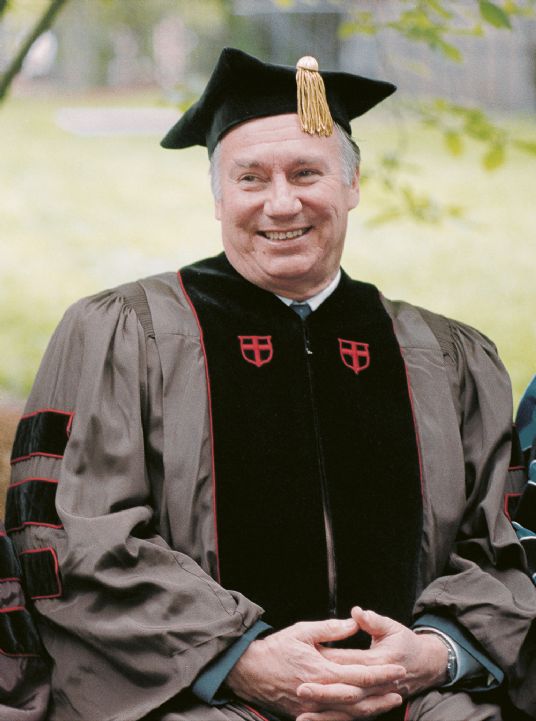
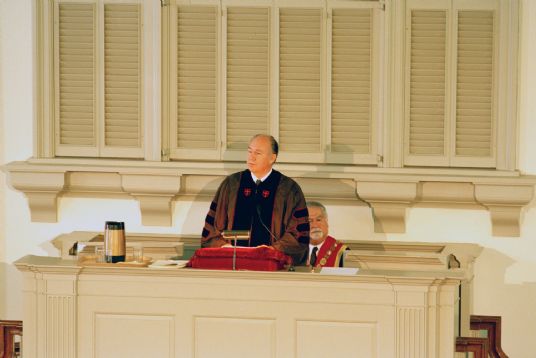
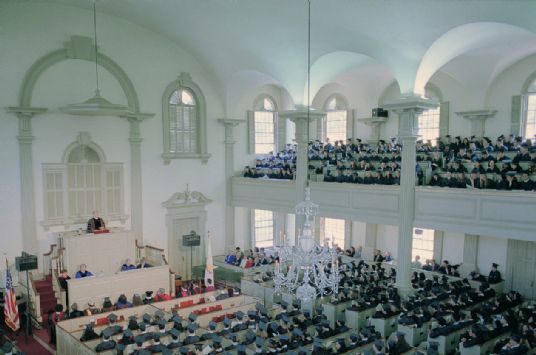
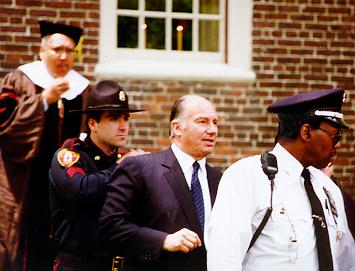
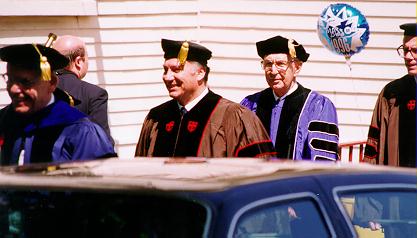
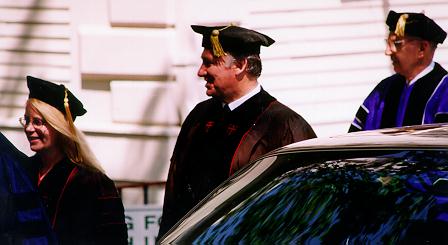
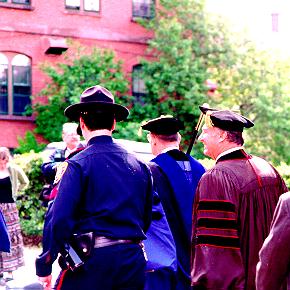
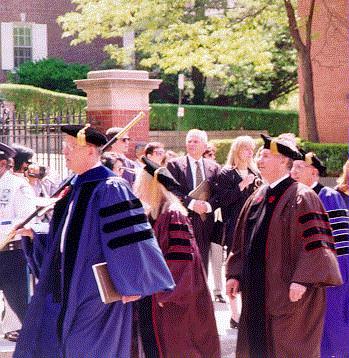
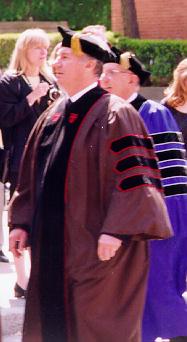

![]() Aga Khan's address at MIT commencement
Aga Khan's address at MIT commencement
![]() Aga Khan's address at MIT commencement
Aga Khan's address at MIT commencement
![]() Founder of Aga Khan University
Founder of Aga Khan University
![]() His Speech to the Commonwealth Press Union
His Speech to the Commonwealth Press Union
![]() His Highness the Aga Khan to receive honorary degree Doctor of Laws LL.D
read story
His Highness the Aga Khan to receive honorary degree Doctor of Laws LL.D
read story
![]() His Highness Aga Khan Bio at Brown
His Highness Aga Khan Bio at Brown
![]() A bridge of Hope Islam's diversity
A bridge of Hope Islam's diversity
![]() Keeper of the Faith Islam's diversity
Keeper of the Faith Islam's diversity
![]() More Pictures
More Pictures
![]() The Aga Khan Speaks at MIT Commencement - Massachusetts Institute of Technology graduation exercises at Killian Court on Friday, May 27, 1994)
The Aga Khan Speaks at MIT Commencement - Massachusetts Institute of Technology graduation exercises at Killian Court on Friday, May 27, 1994)
![]() Al Azhar University Founded by the Fatimid Caliph Imams
Al Azhar University Founded by the Fatimid Caliph Imams

